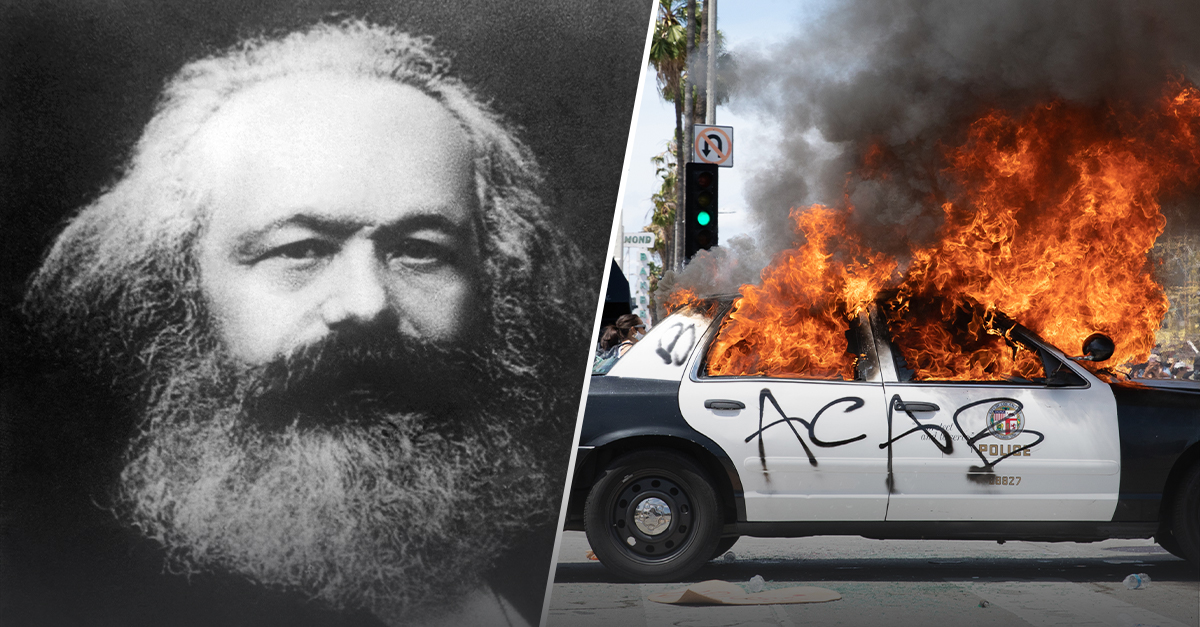


Get a free copy of Parental Rights & Education when you subscribe to our newsletter!

“The champions of socialism…promise the blessings of the Garden of Eden, but they plan to transform the world into a gigantic post office. Every man but one a subordinate clerk in a bureau. What an alluring utopia! What a noble cause to fight!”
–Ludwig von Mises, Economist
Marxism. People are talking about it, and people are using the term dramatically. The word is often used as a slur from conservatives, but sometimes as a badge of honor for liberals.
But what is Marxism?
Marxist philosophies are on the rise in the West both as an economic system and cultural philosophy. Marxism particularly appeals to younger generations who are angered by income inequities and other forms of oppression. Marxism looks appealing, promising equality and fairness for the downtrodden. But unfortunately, its utopian vision is a mirage.
So, again, what is Marxism?
Marxism is the philosophy of German economist and philosopher Karl Marx. In short, Marx’s philosophy was that there were different classes of people: the bourgeoisie and the proletariat. The bourgeoisie were employers who controlled the means of production, the proletariat were the working-class people. Marx believed the bourgeoisie oppressed and exploited the proletariat and that there should be a new economic system to replace capitalism. In this system, wealth would be distributed to those of the proletariat. Ultimately his philosophy became communism and socialism.
While communism took hold in the East, it struggled to gain ground in the West. Countries like the United States provided freedom and economic opportunity, making communism unappealing to most. Marxists adopted the oppressor/oppressed framework to apply to groups based on sex, race, and sexual orientation.
These became philosophies such as Critical Race Theory which views the oppressors as whites and the oppressed as racial minorities, particularly black people. Recently these theories have gained popularity in the West even in Christian circles, as has the somewhat more palatable economic system of socialism.
On the surface, there is a lot to like about the promises of Marxism. Sadly, there are oppressed people and there are people who use their position or wealth to oppress others. Christians are called to help the oppressed and Marxism appears to help the orphan and the widow. Marxism also seems to believe in the equality of all mankind, a true and biblical idea. The rich are not better than the poor and white people are not better than black people. The problem, however, is how Marxists try to address these issues.
As economic systems, communism and socialism have been repeatedly proven to be disastrous. These philosophies ignore the reality that human beings require incentives to work hard and to innovate. In a capitalist society such as we have in the United States, each person has not only the opportunity to work hard in their chosen field, but to advance. If you are the best at your craft, you can earn more money. If you invent a product or process that meets a demand in the economy, you can sell it; this breeds competition, causing people to work more diligently. If the government controls the means of production and everyone is guaranteed to receive a certain amount of money, there is no incentive to work hard or to produce a quality product.
Marxism also grants enormous power to the government, under the woefully naïve premise that the government is fair and impartial. It is expected that the government will distribute wealth and resources fairly and show no partiality, despite thousands of years of history to suggest otherwise. Christianity not only encourages but requires individuals to be charitable and generous, yet it never commands that individuals should be compelled to give their financial resources to the government to redistribute as they see fit.
Cultural Marxism, such as critical race theory and intersectionality, may appeal to Christians’ desires for justice and equality, but their result is the opposite. Marxism divides people based on categories they often have no control over, it is the ultimate form of racism and division. It teaches those in the “oppressed” groups that they are eternal victims of the “oppressor” class, creating resentment and frustration. It teaches those in the “oppressor” class to be ashamed of their skin color or sex because of supposed sins committed by their class.
Even if this is not the intent of Marxist teachings, teachers of Marxism are extremely irresponsible in failing to clearly articulate that the faults of one race’s past are not their own. These concepts are antibiblical and do not reflect the unity we have in Christ.
Marxism appears to offer the opportunity to help the oppressed by lifting them up, but it is really a philosophy of envy and resentment.
Marxism does not lift all to prosperity, it drags all down to poverty. As economist Ludwig von Mises said:
“The champions of socialism call themselves progressives, but they recommend a system which is characterized by rigid observance of routine and by a resistance to every kind of improvement. They call themselves liberals, but they are intent upon abolishing liberty. They call themselves democrats, but they yearn for dictatorship. They call themselves revolutionaries, but they want to make the government omnipotent. They promise the blessings of the Garden of Eden, but they plan to transform the world into a gigantic post office. Every man but one a subordinate clerk in a bureau. What an alluring utopia! What a noble cause to fight!”
If you like this article and other content that helps you apply a biblical worldview to today’s politics and culture, consider making a donation here.
Christian conservative news and issues that matter. Curated just for you!